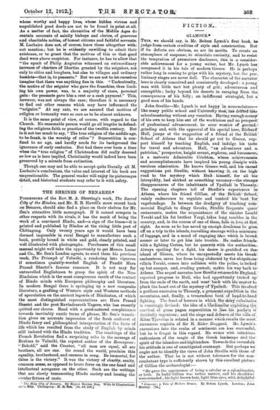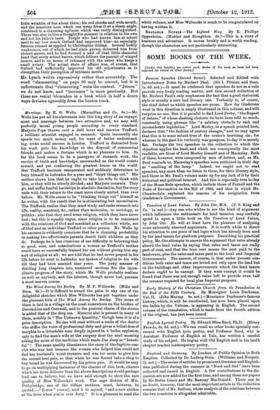GLAMOUR.°
iThis, we should say, is Mr.. Ethyl" -Lynch's first •book, ter judge front certain crudities of style and construction. Bub- if its defects are obvious, so are its nierita. To create an atmosphere of suspense, to stimulate curiosity, and 'to resist • the temptation of premature disclosure, this -is a. considero-. able achievement for a young writer, but Mr. • Lynch had s Compassed it in his tale of modern:Greece. He .is perhaps' rather long in coming to grips with his mystery. but • the pre7r liminary-stages are never dull. The character of ihe nariutor: hero is clearly conceived and consistently developed : a young, man with little tact but plenty of grit; adventurous and susceptible ; lucky beyond his deserts in "escaping front the', consequences of his folly; an indifferent strategist, but a: good man of his hands.
John Strellie—Mr. Lynch is not happy in nomenclature— like many public school and University hie driftittt teo schoolmastering without any vocation. 'HaeirigetiOnglinioneyr of his own to keep him out of the workhoinfe and no prospect' of professional advancement, he soon- wetiritis of gerund.i grinding and, with the approval of his special hero, Richacd- Hull, jumps at the auggestion of a friend ,at the School of Athens that he should "gct out to dreece,' sup:: port himself by teaching English, 'and indulge . his taste: for travel and adventure. Hull, "an adienturer sPa a. patrician," prospector, knight errant, explorer, and. buocaneera is a meteoric Admirable Crichton,. wham! .uchiesenmatal and accomplishments have inspired his .young
emulous admiration. He knows Greece:well, and his 'cases suggestions put Strellie, without -knowing it, on the ;high;
road to the mystery which Hull:: fer all intrepidity, had shirked as- something .uncanny—tlie4trangsi disappearances of the inhabitants of Ypeiltidi in Thessaly;i The' opening chapters tell of Strellit'S experiences Athens, where his friend Gillian, of • the Sclivel,': vainly endeavours to regulate and Control his'bent -.Tor; vagabondage. In between the- drudgery of teaching' com- mercial English to dingy Greeks, .Strellle frequents 'queer" restaurants, makes the acquaintance of the sinister Lanibi Yeraki and his fat brother Yorgi, takes 'long, rambles, in the country, and, in the course of one of them, falls ia lore at first; sight. As soon. as he has- saved .up enough ,clistelinisalie ,goete off on a trip to.the islands, travelling steerage of luggage, and in a mood of engaging ;Opts; which is bound, sooner or later to get him into trouble:, He.,makec with a fighting Cretan, but- he quarnele.with the authoritieso Always spoiling for a fight, his ,desire iti.gratified otl thin island of Gioura, where he unexpectedly' meets his Gtiyaki enchantress, saves her from being abducted by the mbiquitoitel villain Yeraki, comes into collision with the Pollee, isol6iiliect' up but escapes, and, evading pursuit, makes '-hitrvittyhaeli toy Athens. The sequel narrates how Strellie rettirtietlfiet reported progress to Hull, who had oppoffitnelk. tilrned tire• from the ends of the earth, and. weld-beck with hls'inaiitet *pluck- the heart out of the mystery'of ` psiladi." !Psis ftivorved� a perilous excursion to Thessaly, a. grnesolakeipeditloYt in thos' mountains, and finally, a tremendous bent' of Band to-band' fighting. The feast of horrors in which 'ilitifilltryetibilinates: is cunningly devised: the idea of a blackmailer exploiting 41: survival of gross pagan superstition to „Tine. his :pppkets decidedly ingenious ; and the siege aadslefencerof the rills.of. Kitso Tjavellas is related in a manner. whicilrocalls the moat: strenuous exploits of Sir H. Rider. Haggard. 'Alr. Lynch's! excursions into the realm of sentiment are less successful,: but he is frugal in this- regard. He writes • with infectious_ enthusiasm of the magic of the Greek landscape ad: the spirit of the islanders and highlanders. Towards the townsfolk - his attitude is one of unmitigated contempt. But perhaps we ought not to identify the views of-john Strellie with-those of
the author. That he is not without tolerance for the non- - combatant type is sufficiently shown by this excellent picture of Gillian the archaeologist :—
" He gave the appearance of being a scholar or a schoolmaster, or both. In build Gillian was rather narrow, and this shoulders were rounded ; his light brown hair, light blue eyes, with delightful • Glamour : a Tale of Rodent Grave. By Selina Lynch. Murray. [03a3
little wrinkles of fun about them ; his,red cheeks and wide mouth, and the sensitive nose which ran -away from it at a sharp angle, combined in a charming ugliness which was verily distinguished. There was also in him a thought for raiment in relation to his own and not his tailor's taste. People who had known him at school used to say how much Oxford had improved him—an especially fatuous remark as applied to Christopher Gillian. Several bodily weaknesses, out of which he had since grown, debarred him from violent games, and he had formed a unit of that little shameful band that every school knows, which follows the pursuit of winged insects, and is on terms of intimacy with the usher who keeps a small aviary. The actual state of affairs was, of course, that Oxford had sufficiently improved his old schoolmates as to strengthen their perception of intrinsic merits."
Mr. Lynch writes expressively rather than accurately. The word "clammering " on page 93 may be correct, but it is unfortunate that " clamouring " suits the context. " Jetson " we do not know, and " tarriance " is mere preciosity. But these are venial blemishes in a book which in half a dozen ways deviates agreeably from the beaten track.











































 Previous page
Previous page